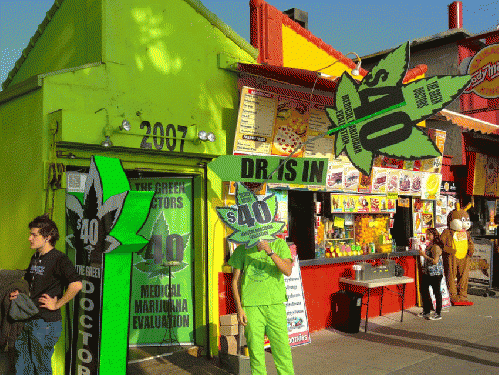From Truthdig

A medical marijuana shop at Venice Beach in Los Angeles, Calif.
(Image by (Adam Jones / CC BY-SA 2.0)) Details DMCA
Spurred by the heavily cash-reliant cannabis industry, Los Angeles residents will be the first in the country to vote on a public banking mandate, after the City Council agreed on June 29 to put a measure on the November ballot that would allow the city to form its own bank.
The charter for the nation's second-largest city currently prohibits the creation of industrial or commercial enterprises by the city without voter approval. The measure, introduced by City Council President Herb Wesson, would allow the city to create a public bank, though federal and state legal hurdles would remain to be cleared.
The bank is also expected to save the city millions, if not billions, of dollars in Wall Street fees and interest paid to bondholders, while injecting new money into the local economy, generating jobs and expanding the tax base. It could respond to the needs of its residents and reinvest in low-income housing, critical infrastructure projects and clean energy.
The push for such a bank comes amid ongoing concerns involving the massive amounts of cash generated by the cannabis business, which was legalized by California's Proposition 64 in 2016. Wesson has said cannabis has "kind of percolated to the top" of the public bank push, "but it's not what's driving" it, citing affordable housing and other key issues. He added the concept of a public bank should be pursued regardless of the cannabis issue.
However, the prospect of millions of dollars in tax revenue is an obvious draw. Los Angeles is the largest cannabis market in the state, with Mayor Eric Garcetti estimating it would bring in $30 million in taxes for the city.
State Board of Equalization member Fiona Ma, who is running for state treasurer, says California's $8 billion to $20 billion cannabis industry is still operating mostly in cash almost two years after state legalization. She adds that the majority of businesses are operating on the black market without paying taxes. This is in large part because federal law denies them access to the banking system, forcing them to deal only in cash and causing logistical nightmares when paying taxes and transferring money.
Cannabis is still a forbidden Schedule-1 drug under federal law, and the Federal Reserve has refused to give a master account to banks taking cannabis cash. Without a master account, they cannot access Fedwire transfer services, essentially shutting them out of the banking business.
In a surprise move in early June, President Trump announced he "probably will end up supporting" legislation to let states set their own cannabis policy. But Ma says that while that is good news, California cannot wait on the federal government. She and state Sen. Bob Hertzberg, D-Los Angeles, have introduced Senate Bill 930, which would allow state-chartered banks and financial institutions to apply for a special cannabis banking license to accept clients after a rigorous process that follows regulations from the U.S. Treasury Department. The bill cleared a major legislative hurdle when it was approved by the state Senate on May 30.
SB 930 focuses on California state-chartered banks, which can operate under a closed-loop system with private deposit insurance, unlike federally chartered banks. As Ma explained in a May 17 article in the Sacramento Bee:
"There are two types of banks -- those with federal charters, and banks with California charters. Because cannabis is still considered a Schedule-1 narcotic, we cannot touch federal banking wires. We want state-chartered banks that are protected, regulated and certified under California law, and not required to be under the FDIC.
"State income taxes, sales taxes, unemployment, workers' compensation and property taxes could all be paid through a closed-loop system that takes in revenue from the cannabis industry, but is apart from the federal banking system. ... Cannabis businesses could be part of a cashless system similar to Apple Pay, and their money would be insured by a state-licensed institution."
That is a pretty revolutionary idea -- a closed-loop California banking system that is independent of the Federal Reserve and the federal system. The provisions of SB 930 would allow only cannabis cash to bypass the federal system, and the bill strictly limits what the checks issued by pot banks can be. But the prospects it opens up are interesting. California is now the fifth-largest economy in the world, with 39 million people. It has the resources for its own cashless "CalPay" or "CalCoin" system that could bypass the federal system altogether.
The Bank of North Dakota, currently the nation's only state-owned depository bank, has been called a "mini-Fed" for that state. California, with more than 50 times North Dakota's population, merits its own mini-Fed as well. The Bank of North Dakota partners with local banks to make below-market loans for community purposes, including 2 percent loans for local infrastructure, while at the same time turning a tidy profit for the state. In 2017, it recorded its 14th consecutive year of record profits, with $145.3 million in net earnings and a return on the state's investment of 17 percent.
It is significant that the proposal for a closed-loop California system is coming from players that have political clout. Ma won the June primary election for state treasurer by a landslide, and the current state treasurer, John Chiang, has been exploring for over a year the possibility of a public bank that could take cannabis cash. Lt. Gov. Gavin Newsom, the front-runner for governor, also has called for the creation of a public bank. These are not armchair academics but the people who make political decisions for the state, and they have substantial popular support.
(Note: You can view every article as one long page if you sign up as an Advocate Member, or higher).





